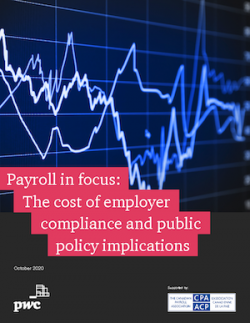

Features
Payroll
Economy
Canada’s economic recovery stifled by high costs of payroll compliance: CPA
By Talent Canada Staff
 The Toronto Stock Exchange on Bay Street. Photo: pictore/Getty Images
The Toronto Stock Exchange on Bay Street. Photo: pictore/Getty Images Payroll compliance in Canada is complex and expensive, costing employers an estimated $12.5 billion per year — and it’s stifling the country’s economic recovery, according to a new report.
The research, commissioned by the Canadian Payroll Association (CPA) and conducted by PwC Canada, notes the full cost to the economy are likely even higher due to the government’s need to audit such as complex system, as well as missed economic activities.
The challenges faced by employers with regards to payroll compliance may make Canada less attractive for investment. To that end, the report calls for a more user-friendly payroll system — particularly in the business environment created by the COVID-19 pandemic, wherein telecommuting and cross-border hiring are becoming more-and-more prevalent.
“At a time when we can least afford it, the labyrinth of legislative requirements governing payroll is impeding our economy’s growth — forcing Canadian businesses to invest billions of dollars and thousands of hours just to be compliant,” says Peter Tzanetakis, President of the Canadian Payroll Association.
“It’s troubling that the economic recovery of Canada, its businesses and people, might be hindered by compliance requirements that are actually fixable.”
Disincentive to investment
The report from PwC indicates that the high costs of compliance have created a less than favourable business investment climate.
For Canadian businesses, especially small businesses which have been hardest hit by the pandemic, the high costs and complexity are diminishing their ability to innovate, and to expand into new Canadian markets. The report highlights the fact that employers operating in multiple provinces spend more time on payroll compliance than those operating in a single jurisdiction.
“Organizations that are looking to establish a presence across Canada are also faced with regulatory disharmony between provincial jurisdictions,” says Tzanetakis. “This makes Canada less appealing for international companies considering entering the Canadian market — which is even more alarming given the increasing shift to global business operations with more remote workers.”
Unspoken costs
The report acknowledges there to be many other unspoken costs associated with compliance, including those incurred by the government in administering audits and policing non-compliance, as well as additional costs arising from the pandemic.
“Employers are not the only ones negatively impacted by our current compliance regime,” says Tzanetakis.
“There are also significant costs to governments under the current compliance regime — not to mention the additional costs arising from the complexity of COVID-19 programs — all of which have yet to be quantified.”
Under the current system, businesses of all sizes found it challenging to access government support programs during the pandemic, highlighting the need for harmonization and a digital, more accessible payroll system. Part of the challenge stems from the large number of announcements impacting businesses since the pandemic — more than 300 since March — which have increased payroll’s complexity.
CPA calls on governments to act now
The CPA says there are actions governments can take now, by working with employers and payroll experts, to reduce compliance costs and help build a better, more resilient economy.
Doing so will deliver what it calls a “triple win outcome” — benefiting employers, individuals, and the government. Reducing the costs of compliance will unlock capital and resources for businesses to invest in innovation and expansion.
The report calls for the following actions:
- Simplifying the taxation system, starting with taxable benefits. Currently, the accurate identification and valuation of taxable benefits is one of the most onerous responsibilities for payroll professionals. The government can help by reviewing and updating policies that are outdated or lack clarity and by reviewing tax-free benefit thresholds that have not been indexed with inflation in recent years, such as the $650 tax-free allowance for moving expenses which has not changed since 1984.
- Harmonizing payroll policy. Presently, businesses in every province and territory are operating under different rules. Greater harmonization of payroll policies across Canada would decrease the complexity and costs associated with compliance and create a business investment climate more conducive for Canadian businesses and international companies wishing to expand into Canada.
- Implementing a digital payroll system. A digital payroll system would enable employers to input payroll data into a system that would then be securely accessed by governments and agencies to calculate benefit entitlements and remittance obligations. As a long-term objective, digital payroll would significantly reduce the costs of compliance and increase data integrity, transparency, and pave the way for more effective delivery of Canada’s social programs.
The report
 Payroll in Focus: The Cost of Employer Compliance and Public Policy Implications, is the second in a series of three inter-related reports authored by PwC Canada, and commissioned by the Canadian Payroll Association, to bring into focus the value that the payroll profession provides to all businesses and society as a whole.
Payroll in Focus: The Cost of Employer Compliance and Public Policy Implications, is the second in a series of three inter-related reports authored by PwC Canada, and commissioned by the Canadian Payroll Association, to bring into focus the value that the payroll profession provides to all businesses and society as a whole.
The reports’ findings are based on PwC Canada research collected through interviews and focus groups with payroll professionals in a range of roles, a survey of over 2,400 payroll professionals, and secondary sources. PwC Canada used economic and analytics tools to analyze the collected data.
For more information on the report, visit payrollinfocus.payroll.ca.
Print this page